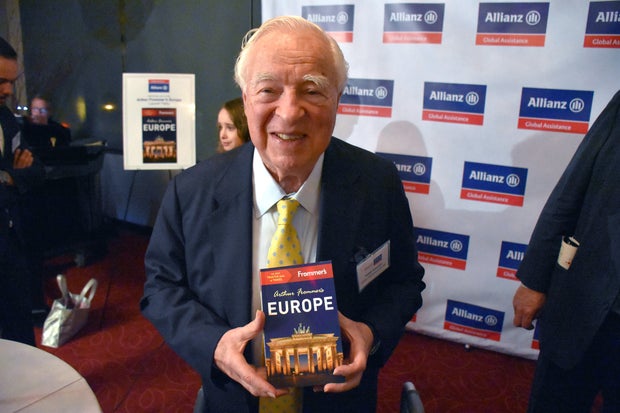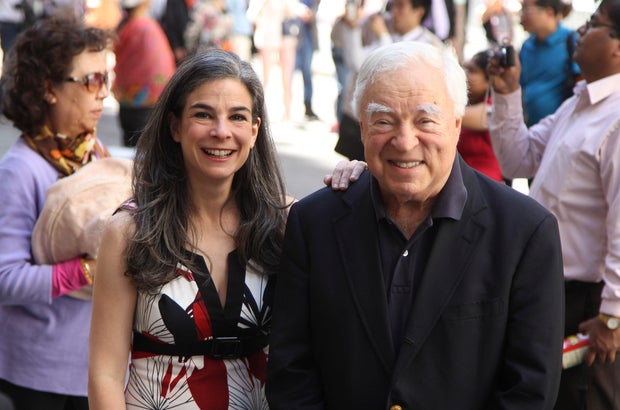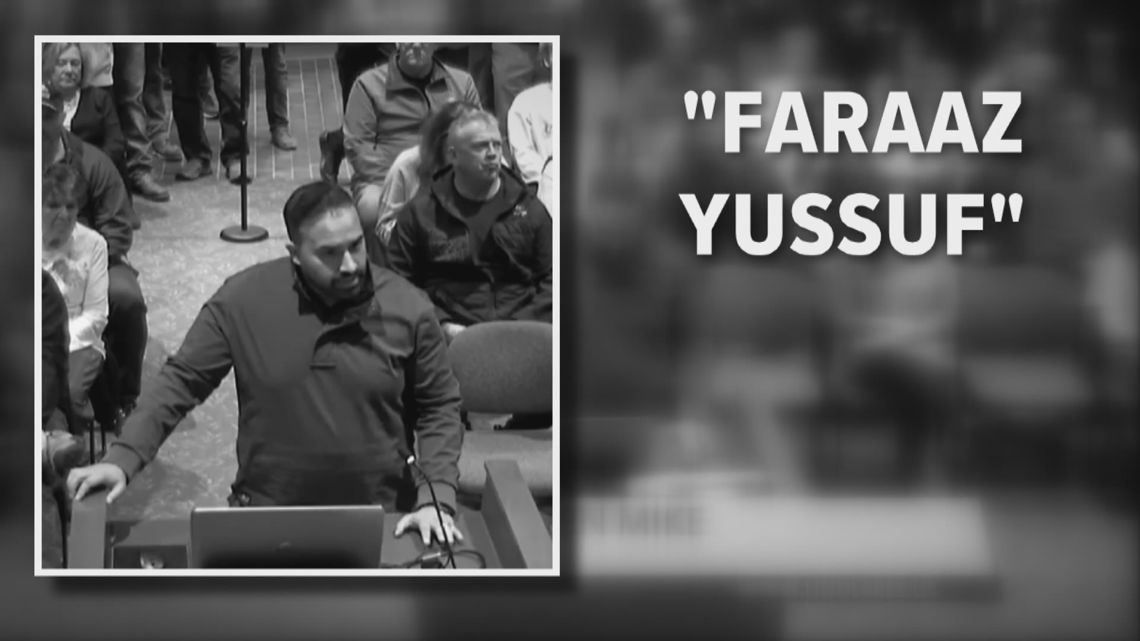CBS News
Boeing responds to Justice Department’s allegations, says it didn’t violate deferred prosecution agreement
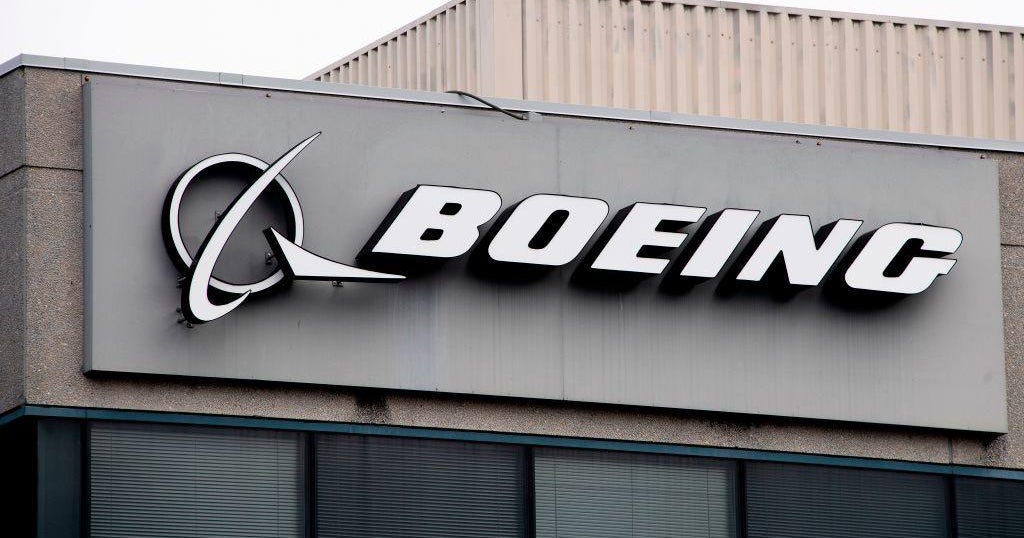
Embattled aircraft giant Boeing Wednesday argued to the Justice Department that the company has upheld its end of a 2021 deferred prosecution agreement, and pushed back at federal prosecutors who wrote last month that the plane manufacturer has violated the deal and risked being prosecuted, two people familiar with the discussions confirmed to CBS News.
Boeing’s response was submitted after prosecutors told a federal judge in Texas in May that the company had breached the agreement that would have led to the Justice Department dropping criminal charges tied to the two 737 Max crashes in 2018 and 2019 — which killed a total of 346 people — because prosecutors said Boeing did not set up sufficient compliance measures.
Boeing responded Wednesday and said it disagreed, the two people said. Bloomberg first reported the news.
A federal judge in Texas is overseeing the back-and-forth between the parties. Boeing had until Thursday to counter the Justice Department’s claims.
When reached by CBS News, the Justice Department declined to comment on the report.
In January 2021, Boeing and the federal government reached a deal in which the company agreed to pay a $2.5 billion settlement and abide by certain stipulations in exchange for the Justice Department dropping a fraud conspiracy charge after three years. That three-year period was scheduled to expire in July.
However, last month, federal prosecutors wrote that Boeing “breached its obligations” under the deferred prosecution agreement, in part by allegedly failing to “design, implement, and enforce a compliance and ethics program to prevent and detect violations of the U.S. fraud laws throughout its operations.”
In January, the cabin door of an Alaska Airlines Boeing 737-MAX 9 blew out minutes after takeoff from Portland, Oregon. Then in March, a person familiar with the matter confirmed to CBS News that prosecutors were looking at whether anything that led up to or contributed to the blowout might affect the deferred prosecution agreement.
In a statement provided to CBS News Wednesday, a Boeing spokesperson said that “we’ll decline to comment on any specific communications with the Justice Department, however we continue to engage transparently with the Department, as we have throughout the term of the agreement.”
CBS News
Arthur Frommer, famed travel guide innovator, has died at 95

New York — Arthur Frommer, whose “Europe on 5 Dollars a Day” guidebooks revolutionized leisure travel by persuading average Americans to take budget vacations abroad, has died. He was 95.
Frommer died from complications of pneumonia, his daughter Pauline Frommer said Monday.
“My father opened up the world to so many people,” she said. “He believed deeply that travel could be an enlightening activity and one that did not require a big budget.”
Chris Melzer / picture alliance via Getty Images
Frommer began writing about travel while serving in the U.S. Army in Europe in the 1950s. When a guidebook he wrote for American soldiers overseas sold out, he launched what became one of the travel industry’s best-known brands, self-publishing “Europe on 5 Dollars a Day” in 1957.
“It struck a chord and became an immediate best-seller,” he recalled in an interview with The Associated Press in 2007, on the 50th anniversary of the book’s debut.
The Frommer’s brand, led today by Pauline Frommer, remains one of the best-known names in the travel industry, with guidebooks to destinations around the world, an influential social media presence, podcasts and a radio show.
Frommer’s philosophy – stay in inns and budget hotels instead of five-star hotels, sightsee on your own using public transportation, eat with locals in small cafes instead of fancy restaurants – changed the way Americans traveled in the mid- to late 20th century. He said budget travel was preferable to luxury travel “because it leads to a more authentic experience.” That message encouraged average people, not just the wealthy, to vacation abroad.
It didn’t hurt that his books hit the market as the rise of jet travel made getting to Europe easier than crossing the Atlantic by ship.
The books became so popular that there was a time when you couldn’t visit a place like the Eiffel Tower without spotting Frommer’s guidebooks in the hands of every other American tourist.
Seth Wenig / AP
Frommer’s advice also became so standard that it’s hard to remember how radical it seemed in the days before discount flights and backpacks.
“It was really pioneering stuff,” Tony Wheeler, founder of the Lonely Planet guidebook company, said in an interview in 2013. Before Frommer, Wheeler said, you could find guidebooks “that would tell you everything about the church or the temple ruin. But the idea that you wanted to eat somewhere and find a hotel or get from A to B — well, I’ve got a huge amount of respect for Arthur.”
“Arthur did for travel what Consumer Reports did for everything else,” said Pat Carrier, former owner of The Globe Corner, a travel bookstore in Cambridge, Massachusetts.
The final editions of Frommer’s groundbreaking series were titled “Europe from $95 a Day.”
Frommer guides reborn
The concept no longer made sense when hotels couldn’t be had for less than $100 a night, so the series was discontinued in 2007. But the Frommer publishing empire didn’t disappear, despite a series of sales that started when Frommer sold the guidebook company to Simon & Schuster. It was later acquired by Wiley Publishing, which in turn sold it to Google in 2012. Google quietly shut the guidebooks down, but Arthur Frommer – in a David vs. Goliath triumph – got his brand back from Google. In November 2013 with his daughter Pauline, he relaunched the print series with dozens of new guidebook titles.
“I never dreamed at my age I’d be working this hard,” he told the AP at the time, age 84.
Frommer also remained a well-known figure in 21st century travel, opinionated to the end of his career, speaking out on his blog and radio show.
He hated mega-cruise ships and railed against travel websites where consumers put up their own reviews, saying they were too easily manipulated with phony posts. And he coined the phrase “Trump Slump” in a widely quoted column that predicted a slump in tourism to the U.S. after Donald Trump was elected president the first time.
Depression-era roots
Frommer was born in Lynchburg, Virginia, and grew up during the Great Depression in Jefferson City, Missouri, the child of a Polish father and Austrian mother. “My father had one job after another, one company after another that went bankrupt,” he recalled. The family moved to New York when he was a teenager. He worked as an office boy at Newsweek, went to New York University and was drafted upon graduating from Yale Law School in 1953. Because he spoke French and Russian, he was sent to work in Army intelligence at a U.S. base in Germany, where the Cold War was heating up.
His first glimpse of Europe was from the window of a military transport plane. Whenever he had a weekend leave or a three-day pass, he’d hop a train to Paris or hitch a ride to England on an Air Force flight.
Eventually, he wrote “The GI’s Guide to Traveling in Europe” and, a few weeks before his Army stint was up, he had 5,000 copies printed by a typesetter in a German village. They were priced at 50 cents apiece and distributed by the Army newspaper, Stars & Stripes.
Shortly after he returned to New York to practice law at the firm Paul, Weiss, Rifkind, Wharton & Garrison, he received a cable from Europe. “The book was sold out, would I arrange a reprint?” he said.
Soon after, he spent his month’s vacation from the law firm doing a civilian version of the guide. “In 30 days I went to 15 different cities, getting up at 4 a.m., running up and down the streets, trying to find good cheap hotels and restaurants,” he recalled.
The resulting book, the very first “Europe on 5 Dollars a Day,” was much more than a list. It was written with a wide-eyed wonder that verged on poetry: “Venice is a fantastic dream,” Frommer wrote. “Try to arrive at night when the wonders of the city can steal upon you piecemeal and slow. … Out of the dark, there appear little clusters of candy-striped mooring poles; a gondola approaches with a lighted lantern hung from its prow.”
Frommer eventually gave up law to write the guides full-time.
Daughter Pauline joined him with his first wife, Hope Arthur, on their trips starting in 1965, when she was 4 months old. “They used to joke that the book should be called ‘Europe on Five Diapers a Day,'” Pauline Frommer said.
In the 1960s, when inflation forced Frommer to change the title of the book to “Europe on 5 and 10 Dollars a Day,” he said “it was as if someone had plunged a knife into my head.”
Dispelling false impressions
Asked to summarize the impact of his books in a 2017 Associated Press interview, he said that in the 1950s, “most Americans had been taught that foreign travel was a once-in-a-lifetime experience, especially travel to Europe. They were taught that they were going to a war-torn country where it was risky to stay in any hotel other than a five-star hotel. It was risky to go into anything but a top-notch restaurant. … And I knew that all these warnings were a lot of nonsense.”
He added: “We were pioneers in also suggesting that a different type of American should travel, that you didn’t have to be well-heeled.”
To the end of his life, he said he avoided traveling first class. “I fly economy class and I try to experience the same form of travel, the same experience that the average American and the average citizen of the world encounters,” he said.
As Frommer aged, his daughter Pauline gradually became the force behind the company, promoting the brand, managing the business and even writing some of the content based on her own travels. Her relationship with her father was both tender and respectful, and she summed it up this way in a 2012 email to AP: “It’s wonderful to have a working partner whose mind is a steel trap and who doesn’t just have smarts, but wisdom. His opinions, whether or not you agree with them, come from his social values. He’s a man who puts ethics at the center of his life, and weaves them into everything he does.”
In addition to Pauline, Frommer’s survivors include his second wife, Roberta Brodfeld, and four grandchildren.
CBS News
California Gov. Newsom defers clemency decision as incoming LA County district attorney reviews Menendez brothers case

California Gov. Gavin Newsom will defer his decision on the Menendez brothers’ clemency petition to allow for incoming Los Angeles County District Attorney Nathan Hochman to review the case, his office announced Monday.
“The Governor respects the role of the District Attorney in ensuring justice is served and recognizes that voters have entrusted District Attorney-elect Hochman to carry out this responsibility,” Newsom’s office said in a statement. “The Governor will defer to the DA-elect’s review and analysis of the Menendez case prior to making any clemency decisions.”
Lyle and Erik Menendez have spent roughly 35 years in state prison after they were convicted in their parents’ 1989 murder. Outgoing District Attorney George Gascón sent letters in support of the brothers’ clemency to Newsom after a Netflix show and documentary revived interest in the brothers’ case.
“I strongly support clemency for Erik and Lyle Menendez, who are currently serving sentences of life without possibility of parole. They have respectively served 34 years and have continued their educations and worked to create new programs to support the rehabilitation of fellow inmates,” Gascón said in a statement before losing his re-election bid.
In an interview, Hochman said if the case is not resolved by a Nov. 25 habeas petition hearing — when a judge will hear a motion requesting to vacate the first-degree murder convictions — he will review the case to determine whether or not to recommend resentencing.
Hochman, who will be sworn in on Dec. 2, indicated that he would petition the court for additional time to review the cast ahead of the resentencing hearing scheduled for Dec. 11.
“I wouldn’t engage in delay for delay’s sake because this case is too important to the Menendez brothers,” Hochman said in an interview earlier in November. “It’s too important to the victims’ family members. It’s too important to the public to delay more than necessary to do the review that people should expect from a district attorney.”
Such an analysis of the case would involve reviewing thousands of pages of prison files and transcripts of the months-long trials as well as speaking with law enforcement, prosecutors, defense counsel and victims’ family members, he added.
“Whatever position I ultimately end up taking, people should expect that I spent a long time thinking about it, analyzing the evidence,” Hochman said. “But my 34 years of criminal justice experience — involving hundreds of cases as a prosecutor and a defense attorney — allow me to work quickly and expeditiously in conducting this type of thorough review because I’ve done it in many, many cases before.”
After being arrested for their parents’ deaths in 1990, the Menendez brothers went through two trials where prosecutors argued that they murdered their parents because of greed. However, the siblings testified that they killed their parents in self-defense. The brothers told the jury about the alleged sexual abuse they said they experienced at the hands of their father during an emotional, highly publicized first trial.
Following closing arguments, the jurors spent roughly four days deliberating but failed to come to a unanimous decision. The judge declared a mistrial after the jury was unable to deliver a decision.
In the next and final trial, the presiding judge did not allow the defense to submit some evidence connected to the sexual abuse allegations. Prosecutors argued the brothers were lying about the allegations.
The second jury convicted Erik and Lyle Menendez of first-degree murder in 1995 and sentenced them to life in prison without the possibility of parole.
CBS News
Wyoming abortion laws, including ban on pills to end pregnancy, struck down by state judge
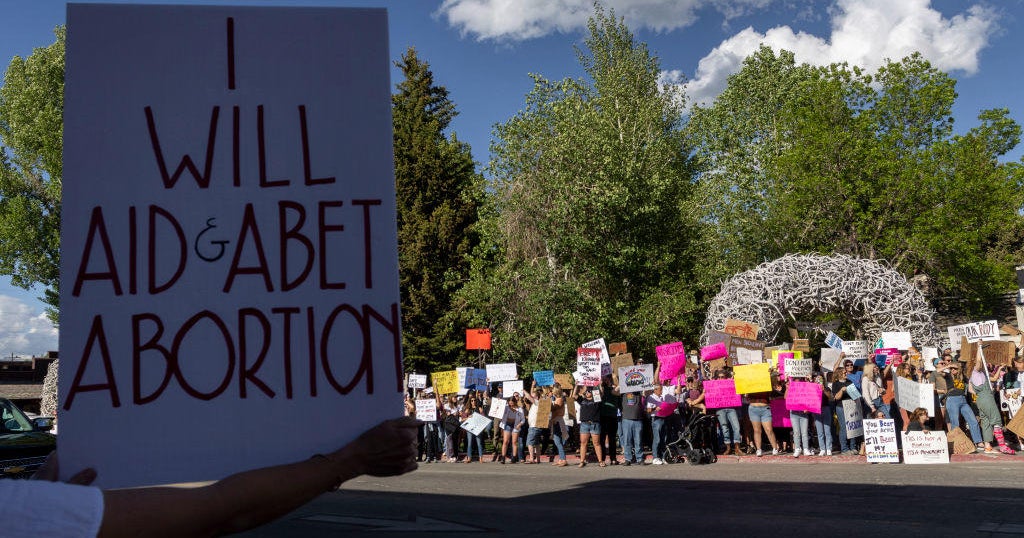
A state judge on Monday struck down Wyoming’s overall ban on abortion and its first-in-the-nation explicit prohibition on the use of medication to end pregnancy in line with voters in yet more states voicing support for abortion rights.
Since 2022, Teton County District Judge Melissa Owens has ruled consistently three times to block the laws while they were disputed in court.
The decision marks another victory for abortion rights advocates after voters in seven states passed measures in support of access.
One Wyoming law that Owens said violated women’s rights under the state constitution bans abortion except to protect a pregnant woman’s life or in cases involving rape and incest. The other made Wyoming the only state to explicitly ban abortion pills, though other states have instituted de facto bans on the medication by broadly prohibiting abortion.
The laws were challenged by four women, including two obstetricians, and two nonprofit organizations. One of the groups, Wellspring Health Access, opened as the state’s first full-service abortion clinic in years in April 2023 following an arson attack in 2022.
“This is a wonderful day for the citizens of Wyoming — and women everywhere who should have control over their own bodies,” Wellspring Health Access President Julie Burkhart said in a statement.
NATALIE BEHRING / Getty Images
The recent elections saw voters in Missouri clear the way to undo one of the nation’s most restrictive abortion bans in a series of victories for abortion rights advocates. Florida, Nebraska and South Dakota, meanwhile, defeated similar constitutional amendments, leaving bans in place.
Abortion rights amendments also passed in Arizona, Colorado, Maryland and Montana. Nevada voters also approved an amendment in support of abortion rights, but they’ll need to pass it again it 2026 for it to take effect. Another that bans discrimination on the basis of “pregnancy outcomes” prevailed in New York.
The abortion landscape underwent a seismic shift in 2022 when the U.S. Supreme Court overturned Roe v. Wade, a ruling that ended a nationwide right to abortion and cleared the way for bans to take effect in most Republican-controlled states.
Currently, 13 states are enforcing bans on abortion at all stages of pregnancy, with limited exceptions, and four have bans that kick in at or about six weeks into pregnancy — often before women realize they’re pregnant.
Nearly every ban has been challenged with a lawsuit. Courts have blocked enforcement of some restrictions, including bans throughout pregnancy in Utah and Wyoming. Judges struck down bans in Georgia and North Dakota in September 2024. Georgia’s Supreme Court ruled the next month that the ban there can be enforced while it considers the case.
In the Wyoming case, the women and nonprofits who challenged the laws argued that the bans stood to harm their health, well-being and livelihoods, claims disputed by attorneys for the state. They also argued the bans violated a 2012 state constitutional amendment saying competent Wyoming residents have a right to make their own health care decisions.
As she had done with previous rulings, Owens found merit in both arguments. The abortion bans “will undermine the integrity of the medical profession by hamstringing the ability of physicians to provide evidence-based medicine to their patients,” Owens ruled.
The abortion laws impede the fundamental right of women to make health care decisions for an entire class of people — those who are pregnant — in violation of the constitutional amendment, Owens ruled.
Wyoming voters approved the amendment amid fears of government overreach following approval of the federal Affordable Care Act and its initial requirements for people to have health insurance.
Attorneys for the state argued that health care, under the amendment, didn’t include abortion. Republican Gov. Mark Gordon, whose administration has defended the laws passed in 2022 and 2023, did not immediately return an email message Monday seeking comment.
Both sides wanted Owens to rule on the lawsuit challenging the abortion bans rather than allow it to go to trial in the spring. A three-day bench trial before Owens was previously set, but won’t be necessary with this ruling.








